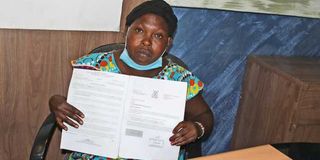A case of two stolen cows and a DNA test

Ms Ann Cherotich, a widow who lost her cows in 2015, shows documents proving her ownership of the recovered cows.
When Ann Cherotich and her husband John Tingiso lost their two Friesian cows to a cattle thief five years ago, their dairy business was shattered.
Ms Cherotich’s life would then be darkened even more, when her husband died two months later in a road accident.
At only 31, she was a widowed mother of three with no source of income.
One day in August this year, as she was travelling to Nakuru, she spotted two cows grazing by the road. The cows had all the features of her stolen animals.
Although five years had passed, she was convinced that the cows she spotted were hers, so she reported the matter to the police, and investigations began.
What appeared like a light at the end of the tunnel turned out to be another puzzle that has proved too complex to resolve.
A veterinary officer familiar with Ms Cherotich’s cows assessed the physical appearance of the cows and was convinced that they were the same ones. But a neighbour, Gloria Kandie, was claiming ownership.
A DNA profiling was done by another vet, and the results proved Ms Cherotich right. The cows’ DNA matched those of the cows that sired them.
However, the ownership of the two animals is now the subject of a legal battle between the two women at the Chief Magistrates’ Court in Nakuru.
Pregnant cows
Ms Cherotich says she lost the cattle on the night of August 27, 2015, around 3am. While sleeping, she and her husband heard a commotion at the cattle shed and when they woke up, found the cows — Rose Nangiene and Kisirani, mother and daughter — gone. Both were pregnant.
They tracked the animals’ footprints, but the trail ran cold on the Nakuru-Kericho highway.
Her husband reported the theft to the Ngata Police Post.
Ms Kandie, on the other hand, maintained that she bought the cows separately from different sellers — one from Nyandarua and the other from Njoro at a total cost of Sh215,000 in 2019. She named the cows Ruma and Legina and produced sale agreements between her and David Mogaka and Paul Majanga.
Investigations revealed that the description given by Ms Cherotich in her earlier police statements tallied with the features of the two cows.
A veterinary officer in charge at Rongai Sub-county office, Mr Peter Ngugi, was engaged to do a DNA test. His findings revealed that the cows were related and belonged to Ms Cherotich.
“All factors considered, Ms Ann Cherotich proved beyond reasonable doubt to be the owner of the two cows,” noted Mr Ngugi in his report dated August 28.
Ms Kandie, however, disputed the report, and the police forwarded the file to the Director of Public Prosecutions.
Nakuru Senior Assistant Director of Public Prosecutions Daniel Karuri, on perusing the file, directed that the cows be handed back to Ms Cherotich, their legal owner.
The DPP relied on the evidence of Ms Cherotich, her mother, the veterinary officer who used to attend to the animals, and of the police.
Loss of the cattle
“In light of the above expert opinion that the two cows belong to Ms Cherotich, I direct that they be restored... to her,” Mr Karuri ordered on September 9.
Following the DPP’s directive, the Officer Commanding Station at Menengai wrote to Ms Kandie on September 20 directing her to surrender the cows in two days—an order Ms Kandie is challenging in court.
In the case, Ms Kandie has sued Ms Cherotich and the Menengai OCS, accusing them of conspiring to dispossess her of her animals.
She has dismissed the veterinary report as fraudulent.
However, as the case awaits determination by the court Ms Cherotich fears losing the animals as she claims to have no means to put up a fight in court.
According to Ms Cherotich, her husband was deeply stressed by the loss of the cattle and was knocked by a matatu while crossing the highway after a fruitless search for the cows in Molo.
“These animals were my life since I used to sell the milk to Kenya Cooperative Creameries where we managed to support our livelihoods,” she said.




